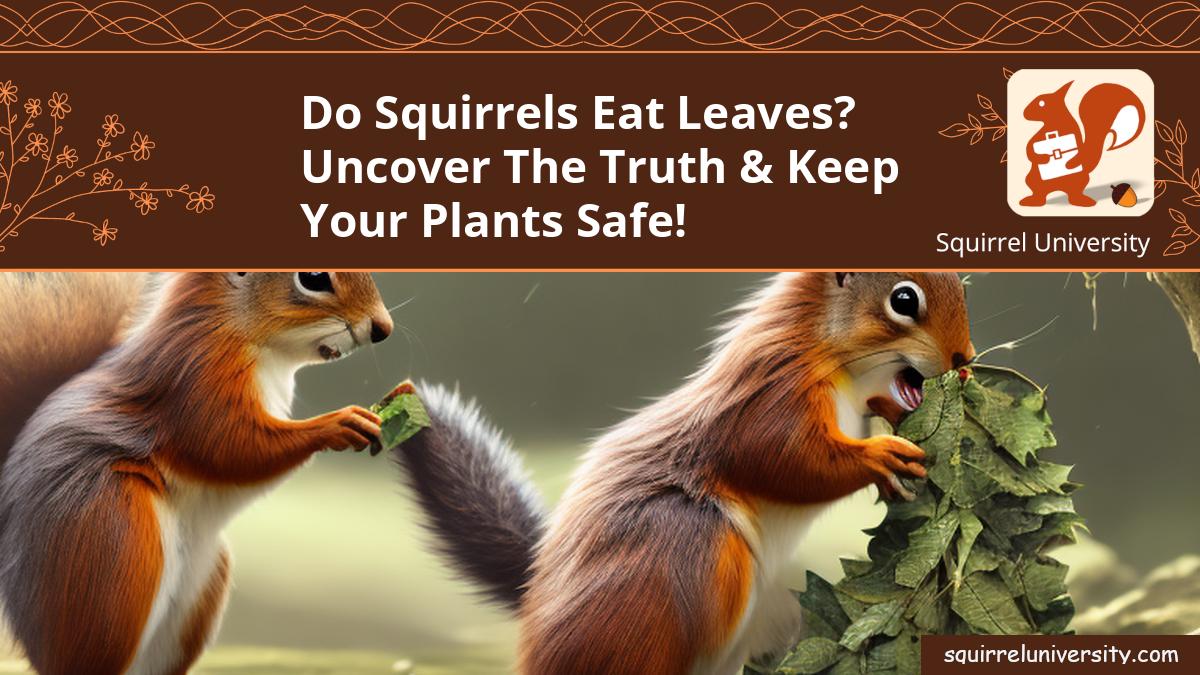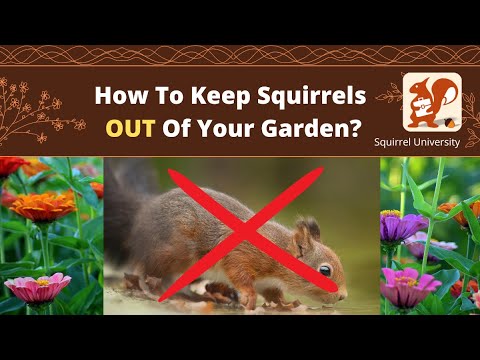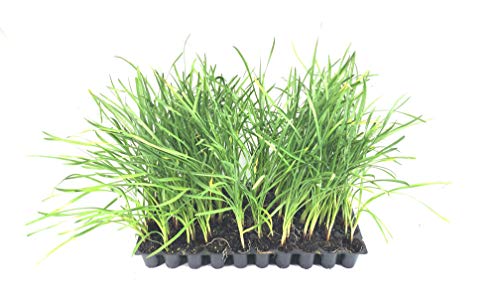As a nature lover, with years of experience observing and interacting with squirrels all around the world, I often get asked: do squirrels eat leaves?
Yes, squirrels eat leaves! They mostly eat the leaves of oak, beech and hazel trees. However, they also enjoy eating other types of foliage, including flowers, buds and shoots.
Having seen them feed on leaves in their natural habitat and watched them nibble on garden foliage, there’s simply no question. But knowing this is only half the battle – you must also accept that if you want to keep your plants safe from hungry squirrels, you’ll have to take certain precautions.
Do Squirrels Eat Leaves?
Squirrels can wreak havoc on your garden or yard, but understanding their typical diet is key to keeping them away. A typical squirrel’s diet consists of a range of items including nuts, fruits, seeds, fungi and even small insects or birds’ eggs. They will also consume tree leaves in some cases, particularly if other sources of food are not available.
What is a Typical Squirell Diet?
A typical diet for an adult squirrel includes items like: nuts like hazelnuts and walnuts; fruits such as apples, peaches, plums; seeds from conifers like pine cones and spruce; mushrooms and other fungi; bird eggs; and occasionally small insects. But what about leaves? While it’s tempting to believe that tree leaves are part of a regular squirell menu, this isn’t necessarily the case.
- In times when other sources of food are scarce or unavailable, squirrels may turn to consuming tree foliage.
- Though they don’t rely on large amounts of it in their diets more often than not.
Tree Leaves are Appealing to Rodents
It’s possible that just like humans eat salad out of convenience and despite its lack of nutritional value—squirrels view leaves as an easy source nutrition if there aren’t any better options around. This means that during periods where nearby trees have shed their fruit bounty—leaves can provide a valuable influx for the creatures’ diets.
The same applies to areas with dense foliage cover where leaves may accumulate easier due to the elements than fruits or nuts would be able to remain dry enough for long periods.: Fruits wouldn’t last long whereas leafy branches tend to keep their nutrients for longer amounts of time even after falling off the parent tree.
Gnawing, Consuming and Browsing on Foliage
Gnawing, consuming and browsing on foliage are all activities that squirrels are known to engage in. The leaves of trees can make an appealing snack for these hungry rodents. They have been seen stripping the bark off twigs, raiding fruit trees and even eating tree buds. Additionally, they can nibble away at flowers and other shrubs when presented with a tasty treat! To protect your plants from these critters, consider implementing deterrents like fences or cayenne pepper-treated bird feeders around your garden.
Graze on Leaves or Feed On Berries?
Fruit bearing vegetation might be preferred compared leafy alternatives as its sweetness offers more advantages nutrition wise over bitter culinary greens That said though there’s always exceptions: some animals might crave greenery later during summer months when fruit trees become barren while perennial grassland plants still hold onto moisture levels offering alternative snacks throughout warmer seasons. These variations all depend upon individual preferences depending too upon which region population size dwelling geographical boundaries amongst many others. All these factors influence how frequently critters dine upon unpalatable plant matter although overall trend appears quite uncommonly encountered.
Prevent Squirrels From Eating Leaves in Your Garden
Keeping pesky squirrels away from your garden and yard can be a challenge. Fortunately, there are various methods you can use to deter them and protect your plants. Some of the best ways to keep squirrels away include natural deterrents, physical barriers, and scare tactics that employ sound or light.
There are several natural deterrents that may help repel squirrels without resorting to harsh chemicals. Keeping your yard neat and tidy may discourage them from gathering in the first place, as untended gardens offer plenty of hiding spots for pests.
Planting certain herbs around your garden such as basil or mint can mask their scent trails and make it harder for them to find food—or even worse, shelter! Additionally, employing a watch dog—or cat—can also deter squirrels since they are instinctively wary of larger predators.
Now, let’s look at some of the best methods to protect your yard from squirrels!
1. Fencing And Other Physical Barriers
One of the most effective ways to keep squirrels out is by creating an obstacle by installing fencing around your garden area. There are various types available including mesh netting made of plastic or metal (such as hardware cloth), chicken wire fencing, or enclosure nets made with high-density polyethylene fibers that don’t allow rodents through but still allow air flow.
2. Hardware Cloth, Chicken Wire and Enclosure Nets
If you’re looking to keep squirrels away from your plants, physical barriers like hardware cloth, chicken wire and enclosure nets may be just the thing! Hardware cloth is galvanized steel mesh with small holes that provide a strong barrier against rabbits, cats and other small animals.
Chicken wire offers a flexible yet durable solution for fencing in yards or gardens. Lastly, an enclosure net provides protection against large birds such as hawks and owls. All of these make great options for controlling pests around vegetable patches and flowerbeds.
3. Sprays To Discourage Reaching Plants
Another option is using barrier sprays on plant foliage which have strong odors like garlic or cayenne pepper. Most repellents will leave an unpleasant taste on the leaves after application so if a rodent does try to take a bite they will quickly abandon it due unappealing flavors.
4. Scare Tactics – Noises and Lights Keep Rodents Away
Using scare tactics is one of the most common methods used to prevent pesky squirrels from munching on vegetation. Utilizing noises and lights can be an effective way to keep them away while still allowing birds to feed in peace. These techniques can involve either natural or artificial scaring agents, such as hawks, owls, predator decoys or bright LEDs.
Ultrasonic devices are a popular choice among those looking for an electronic deterrent with little fuss or mess. They emit high-frequency sounds that cause discomfort for animals within their range—which differ across each device—thus creating a strong aversion to approaching the vicinity of the sound source.
In addition, noise machines are available that imitate noises of predators like coyotes and foxes in order to frighten away small animals from gardens and lawns. Bright LED lights placed around plants can also deter rodents as its constant flashing will act as another type of discomforts.
Finally, you can also scare them with motion-activated sprinklers like the one below:
5. Repellent Plantings That Mask Scent Trails
Using aromatic herbs & flowering shrubs is yet another method proven successful in repelling squirrelly visitors from plant beds & bushes. Herbs like oregano, parsley, thyme, basil, rosemary, sage & mint contain compounds that mask enticing smells for wildlife. Moreover planting fragrant shrubs like honeysuckle or berry bushes near areas frequented by critters may effectively dissuade them from browsing into new places.
- Oregano, parsley, thyme, basil Rosemary Sage & Mint contain compounds that mask enticing smells for wildlife.
- Plant fragrant shrubs like Honeysuckle Or Berry Bushes near areas frequented by critters May effectively dissuade them From Browsing Into New Places.
Conclusion
In conclusion, the answer to the question of whether squirrels do eat leaves is yes, they do. Although their diet mainly consists of nuts, fruits and insects, squirrels will sometimes nibble on leaves as a supplementary food source. This knowledge can help you protect your plants: consider adding some squirrel-proof cages or screens to keep them away from your precious foliage.
Of course, it’s essential to remember that squirrels are wild animals and should be respected accordingly. Always make sure you don’t expose yourself – or them – to harm when trying to keep them away from your garden. But if you follow these guidelines, then there’s no reason why both yourself and the squirrels can’t have a peaceful relationship that respects their natural behavior around plants and leaves.
You may also be interested in reading:










